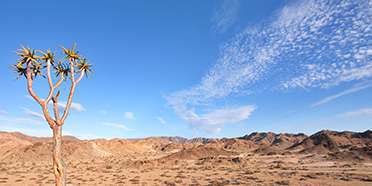- You are here:
- Home
- Countries & Parks
- South Africa Parks & Namibia Parks
- |Ai-|Ais/Richtersveld Transfrontier Park
- Reviews
- Expert Reviews
Expert Reviews – |Ai-|Ais/Richtersveld TP

Ariadne is a renowned African wildlife photographer whose work is featured in many well-known guidebooks and magazines.
4 people found this review helpful.
Magnificent desert flora in the Richtersveld
The Richtersveld has the richest desert flora in the world, but you need to be here at a very specific time after the rains to be able to see any of it. I’ve visited at the best time of the year. This is August-September when Namaqualand is in full bloom. You won’t see carpets of daisies here which are the image of Namaqualand, but if you look closer at the very harsh rugged terrain you’ll see hundreds of tiny little flowers and succulents. Even if you miss the flower season, the Richtersveld is still worth visiting. Not really for its wildlife, but for the beauty of its stark rugged terrain. Animal life is very low and you’ll be lucky to see any big mammals at all. 4x4 is recommended, but I did fine with my ordinary high clearance pick-up truck or bakkie as we say in South Africa. This park gets very few visitors and a feeling of remoteness is definitely part of the appeal. While the scenery and isolation are the main attractions for me, a big interest group for the park is adventure seeking 4x4 enthusiasts.

Philip is an acclaimed travel writer and author of many guidebooks, including the Bradt guides to Uganda, Tanzania, Kenya and South Africa.
2 people found this review helpful.
Land of the mutant plants
The most magnificently isolated of South Africa’s national parks lies on the remote Namibian border formed by the Orange River. It is by no means a conventional safari destination, and is accessible by 4x4 only, and then only after a two day drive from Johannesburg or Cape Town. The main attraction of the region is its ragged scenery and unique vegetation, supporting as it doe some of the most peculiar of the 3,000 plant species endemic to the Karo biome. These include the succulent quiver tree and bulbous halfmensboom, whose name – literally half-human tree – refers to a traditional belief that it is half-plant and half-human. Typical dry-country antelope such as gemsbok, springbok and klipspringer are likely to be seen, and the area supports a number of birds endemic to the arid west of South Africa and Namibia, but it must be emphasised that the park’s remoteness and wilderness feel are its primary attractions, not the wildlife.
Average Expert Rating
- 3.3/5
- Wildlife
- Scenery
- Bush Vibe
- Birding
Rating Breakdown
- 5 star 0
- 4 star 2
- 3 star 4
- 2 star 0
- 1 star 0


 South Africa Parks
South Africa Parks Namibia Parks
Namibia Parks